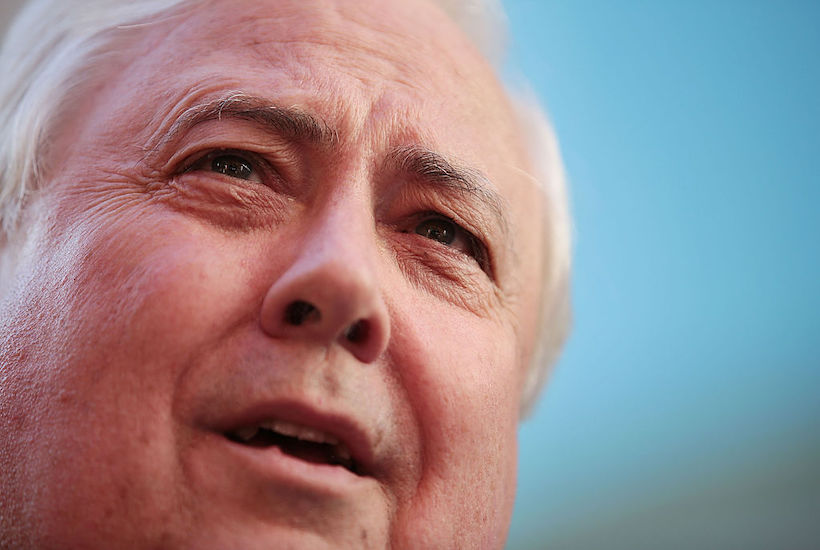The Western Australian government’s draconian legislation passed this month to extinguish the legal rights of Clive Palmer and his flagship company, Minerology, is the kind of thing that would not be out of place in a third world autocracy.
A foundational principle of a free and just society is that the law that governs all Australians is not arbitrary, applies prospectively, that court proceedings are fair and government decisions be subject to review or appeal.
These are the principles known as the rule of law and it is these principles that the WA government has thrown aside with its petty legislation rushed through parliament last week.
The background to this extraordinary legislation is that Minerology and the WA government voluntarily entered into a State Agreement in 2002 for the exploration and development of the Balmoral South Iron Ore Project.
When the Barnett government in 2012 rejected a project proposal from Minerology it violated the state agreement that imposed an obligation on the state to at least assess proposals before making a decision. The dispute came before former High Court judge Michael McHugh QC for independent arbitration who delivered two arbitration awards in 2014 and 2019, finding that the state government was liable for breaches under the State Agreement.
Rather than challenge or appeal the arbitration decisions, WA Attorney-General John Quiggin instead introduced into the parliament a bill seeking to retrospectively nullify the arbitration decisions entirely. Clause 12 of the Bill provides that decisions or actions in relation to the government’s 2012 decision cannot be appealed or reviewed.
It adds that “The Rules known as the rules of natural justice (including any duty of procedural fairness) do not apply to; or in relation to, any conduct of the State that is, or is connected with, a disputed matter.” The Bill also seeks to make documents connected to a “disputed matter” exempt from freedom of information laws and grants criminal immunity to the states and its agents.
In this scenario, the rights under the arbitration awards gave Minerology a proprietary right to claim damages from the state. The state, by negating the awards, has effectively expropriated a proprietary interest held by Minerology.
Expropriation of property is a hallmark of tyrannical governments. Property rights are inextricably tied to individual liberty and limited government. As United States founding father John Adams and second president John Adams famously said: “Property must be secured or liberty cannot exist.” This is because an economic system that respects the right to own property and enforce property rights against others tends to strengthen individual autonomy and independence from the state.
The government’s move is without justification. The arguments in favour of the Bill have been to suggest that schools would be shut and nurses put out of work to pay a damages bill of $30 billion. But Palmer himself asserts that he has not claimed that amount and the hearing to determine damages was scheduled to take place in November 2020.
Premier Mark McGowan has declared the state is “in a war” with Palmer, who has been branded an “enemy of the state”. This is the kind of language that might be applied to a person who is accused of treason. But Palmer’s only crime has been to raise a challenge to the WA border closure rules.
Undoubtedly Clive Palmer has his critics, but he is an Australian and is entitled to argue that the Australian Constitution should be applied, and to raise a challenge if he has standing to do so. The WA government should respect this basic entitlement of Australian citizenship, not make a declaration of war.
The WA government’s excessively petty response is incredibly dangerous. The confirmation that the government is prepared to legislate away its liabilities presents a very real risk to any business who is considering investing in the state. This is the definition of sovereign risk.
Scaring away capital and investment is the last thing Western Australia needs as the country crawls out of depressed economic conditions imposed in response to COVID-19. But this is what the government is risking by pulling away at the threads of the rule of law.
The rule of law is the basic principle the separates the West from the rest of the world. In the World Justice Project’s Rule of Law Index 2020, 8 of the top 10 best performers for the rule of law were in Europe, while number 7 and 9 were New Zealand and Canada respectively. Australia ranked 11th, above the United States and the United Kingdom.
Australia’s political and legal system has a good reputation but this requires a commitment to uphold the rule of law. Decisions like those of the WA government, as well as the arbitrary nature of the lockdowns imposed nationwide this year, demonstrates a recent failure to meet these basic standards of lawmaking.
While no government can claim to have a perfect record the WA government’s response in its dispute with Minerology is a shameful betrayal of a core Australian legal tradition.
Morgan Begg is a research fellow at the Institute of Public Affairs. Join as a member at www.ipa.org.au.
Got something to add? Join the discussion and comment below.
Get 10 issues for just $10
Subscribe to The Spectator Australia today for the next 10 magazine issues, plus full online access, for just $10.


























Comments
Don't miss out
Join the conversation with other Spectator Australia readers. Subscribe to leave a comment.
SUBSCRIBEAlready a subscriber? Log in